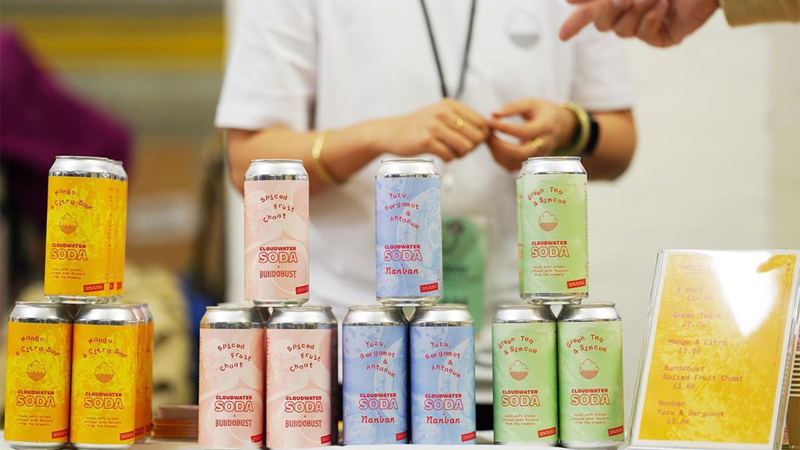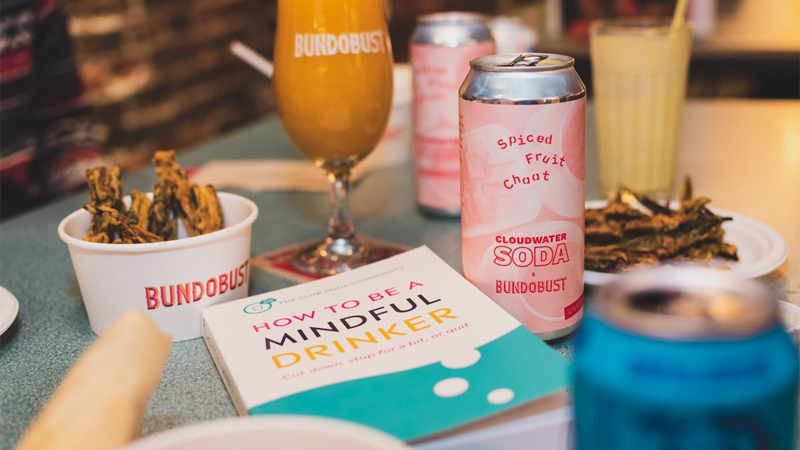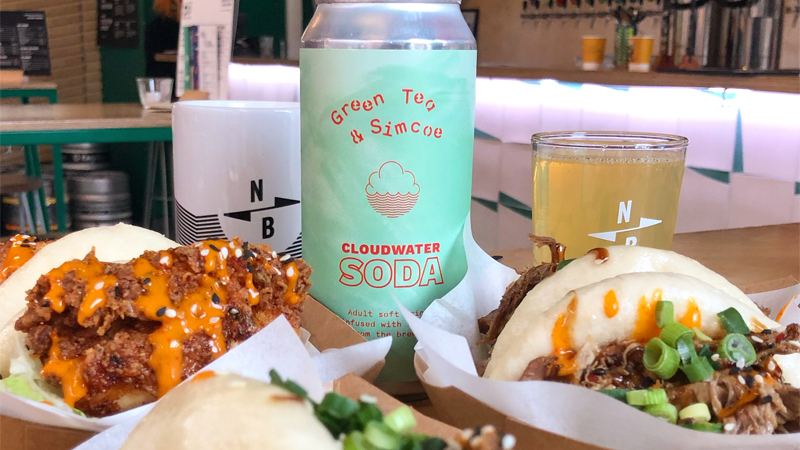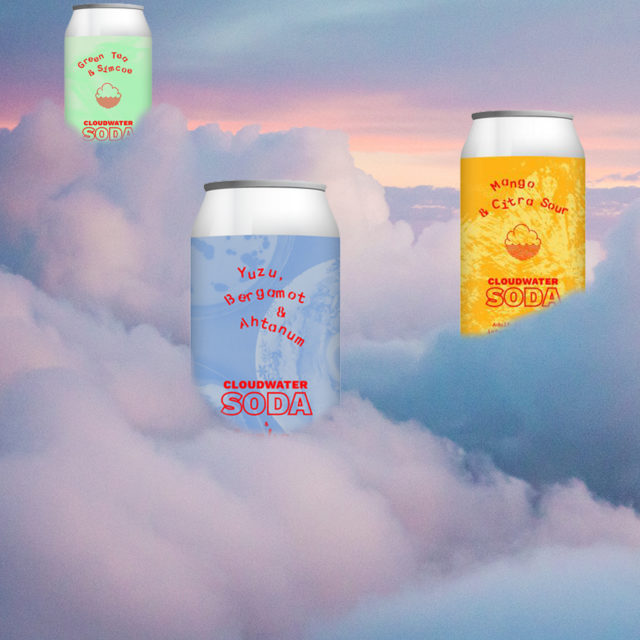Paul Jones has nothing against craft beer — hell, he co-founded one of the U.K.’s most successful craft breweries. The man behind Cloudwater Brew Co. does, however, find certain things lacking in this space.
“I’m no longer drawn to intoxication as I was 20 years ago, as a means of self-medication or numbed self-acceptance,” Jones wrote in a blog post announcing Cloudwater Soda in September 2019. “I’m drawn because craft beer is innately social, and it tastes damn good! Too often though, beer spaces provide no compelling alternatives to alcohol, and too often, non-beer spaces lack the cheer, comfort, or atmosphere of the best taprooms, pubs, or bars.”
That’s why Cloudwater recently debuted a range of, as the cans themselves describe, “adult soft drinks infused with flavors from the brewery.” Though “low-” and “no-” alcohol cocktails are increasing in select bars, and companies like Seedlip and individuals like former NYC bartender John deBary are introducing non-alcoholic spirits, the craft beers with cult followings tend to be hard-hitting IPAs and barrel-aged stouts. Cloudwater is looking to break this pattern.
Don't Miss A Drop
Get the latest in beer, wine, and cocktail culture sent straight to your inbox.Founded in Manchester in 2014 by Jones and then-head-brewer James Campbell, Cloudwater is one of the U.K.’s most prominent young breweries, winning numerous awards including second-best brewery in the world in the 2018 Ratebeer Best, and a fervent international fanbase.
Jones hopes Cloudwater’s sodas speak to drinkers like himself.
“I’ve never really cared for saccharine sweet soft drinks,” Jones says, “and I’ve found alcohol-free beer to be both a partially flawed concept, and mostly very poor in flavor (though some newer brands are making some lovely alternatives). I wanted to create drinks that could be as exciting as the beers we’ve grown a reputation for making, but without added sugar, or without trying to somehow remove alcohol from beer.”
Originally called “Good Call Soda”— multinational brewery Heineken enforced a rebrand in light of the slogan for its subsidiary Foster’s “Good Call” — Cloudwater Soda launched with two flavors using popular craft beer hops: Mango and Citra Sour, and Green Tea and Simcoe.

“Soda gives us a much broader platform,” Jones says of the reason to create sodas, as opposed to going down the alcohol-free beer path. “Rather than trying to mimic the flavor of our beers, we’re taking delicious whole ingredients — hops that I’ve gone to origin to select — and making delicious drinks without trying to avoid or remove anything.”
Jones continues: “Alcohol-free beer is only good for when drinking a beer would already be acceptable, whereas soda can fit any time from morning to the end of the night. … I regularly drink a can of our Green Tea and Simcoe soda in the morning at my desk at work. Drinking an alcohol-free beer at that time would be really, really weird, and maybe a little problematic, too.”
Anja Madhvani, Cloudwater’s soda brand ambassador, feels that, while the purpose is often to make beer inclusive to those who aren’t consuming alcohol at a particular moment, alcohol-free and low-alcohol beers often have the opposite effect.
“There are many people for whom alcohol-free equivalents aren’t appealing,” she says. “Some people have never consumed alcohol for religious or lifestyle reasons, and many people who have struggled with alcohol choose to avoid alcohol-free beers because they find it triggering and worry that it could push them towards full strength counterparts.
“Soda,” she continues, “gives us a chance to meet these consumers with something complex and mature, without raising any conflicting feelings about booze.”
Beyond simply looking to diversify non-alcoholic options available, especially within the context of the craft beer industry where few other offerings exist, Cloudwater Soda also stems from a place of great importance to both Jones and Madhvani: mindfulness.
“I’ve worked in this industry for almost 12 years now, and I’ve had a real love affair with beer, with drinking in general,” Madhvani says. “But these days I try to be more mindful, not only in my drinking, but in all aspects of my life. It comes down to being happy and living in a way that aligns with our basic wants and needs.”
After falling ill last year, Madhvani was forced to reconsider her relationship with alcohol. That served as a catalyst to look at alcohol consumption in general.
“I had struggled with my mental health and working in the industry exacerbated that,” she says. “We often drink without thinking about why, and for me I know that stress and the need to switch off is a big factor. The last couple of years have been a steady journey of finding balance with drink, and it has been absolutely essential to getting me to the point I’m at now. Of course everyone is unique, but collectively as a nation we could do with being more mindful in the way that we create, market, and consume alcohol.”
Jones agrees this approach is “absolutely vital,” adding, “We react, feel aversion to things, or yearn for things for a great many reasons, but if you’re drinking to help you relax and you instead end up sad or upset, or you’re drinking to help yourself enjoy your social life more, but you wake up feeling dreadful, or don’t see friends that aren’t meeting you down the pub, it’s good to become aware of that.”

Although not available in the U.S., many U.K. retailers are stocking Cloudwater Soda, including Beer Merchants, an online retailer based in Aylesford specializing in Belgian and British craft beer. Luke Kulchstein, Beer Merchants director, says stocking the soda was an easy decision.
“As consumers become more interested and educated when it comes to premium or craft produce, be this food produce, beers, clothing, or whatever, it bleeds over into other aspects as well,” Kulchstein says. “For the drinker who is either cutting down/driving that night/pregnant etc., they are more prepared to look at an NA beer or craft soda brand over a more traditional soft drink these days.”
Beer Merchants has worked with Cloudwater since the brewery was founded, too.
“We aim to have a great range across all drinks types,” Kulchstein says. “There is no point going to the trouble to have the best beers and then let down the designated driver or spirit drinker in the group. I think having a range of carefully crafted soft drinks is important to have alongside low/no beers for exactly this reason. If you want to have the best range, you need it to also be diverse.”
With the beer world diversifying its palate seemingly daily, from the influx of NEIPA to brut IPA, all the way through to the hard seltzer craze, it’s no surprise to see an innovative brewery creating a new category within its offerings. It’s unlikely Cloudwater will be the last to do so, either.
Despite the U.K. having lower exposure to drinks such as seltzer water and kombucha — which arguably means there’s greater room for a soda offering such as Cloudwater’s — as a whole, Jones believes the U.K. is simply a better fit for a brewery-produced soda, given a different attitude to alcohol consumption than in the States.
“The U.S. has got a problem when it comes to alcohol consumption and moderating that when it comes to their consumership,” says Jones, who believes modern breweries worry “that coming out with everyday drinking beer is not going to put them on the map. I think that U.S. breweries are being compromised by the fact that they can’t really engage in an authentic conversation with their consumers about alcohol consumption, because a lot of breweries are coming to the market with strong beer, and that’s the center of their business.”
Jones has voiced concerns over the direction the global beer industry is heading in terms of the health of contemporary beer drinkers: With higher ABVs becoming the norm and with higher finishing gravities and calorie contents than ever before, his view is that breweries need to open up dialogues with consumers about consumption and their health, and also to moderate their own output. Ever leading by example, Cloudwater dropped the average ABV across their entire range by 0.5 percent.
In the U.S., where the perception of sessionable beer is 1 or 2 percent higher ABV than in the U.K., approaching lower-alcohol offerings is harder given the prevalence and huge popularity of higher-strength options. “If we’re going to approach the marketplace and prompt them to think about something, it’s a bit weird to flip that conversation round again a day later and say ‘see you on Sunday for the Double Crunchy 8 percent Triple Lactose beer,’” says Jones. This fictitious beer brand joins a long list of actual beers named and concocted with similar ingredients in both the U.S. and U.K.
“I think a lot of craft breweries actually don’t really have the opportunity to approach a no-alcohol, low-alcohol, or soda market because they have never faced their brewery’s output in that direction at all,” Jones says.
Perhaps this will change as consumers’ relationships with beer mature and individuals seek moderation, as Jones has found to be the case among Cloudwater’s consumer base. With internationally recognized breweries such as Cloudwater leading this charge, we may soon see more following suit, prompting a shift in attitude toward the production of lower-ABV products.

In the U.S., however, he feels that it may take some time.
“I can’t speak for others in the industry, but I want us to look back on every year and know we did what was right by our customers,” Jones says. I want people to think about what they’re drinking, and feel the deepest sense of relaxation that comes from knowing exactly what they’re putting into their body.
“Independent breweries need to think about how to address customers’ long-term health concerns as fully as possible,” he continues. “If we get it right, we can make long-term relationships with our customers work well for us all.”
